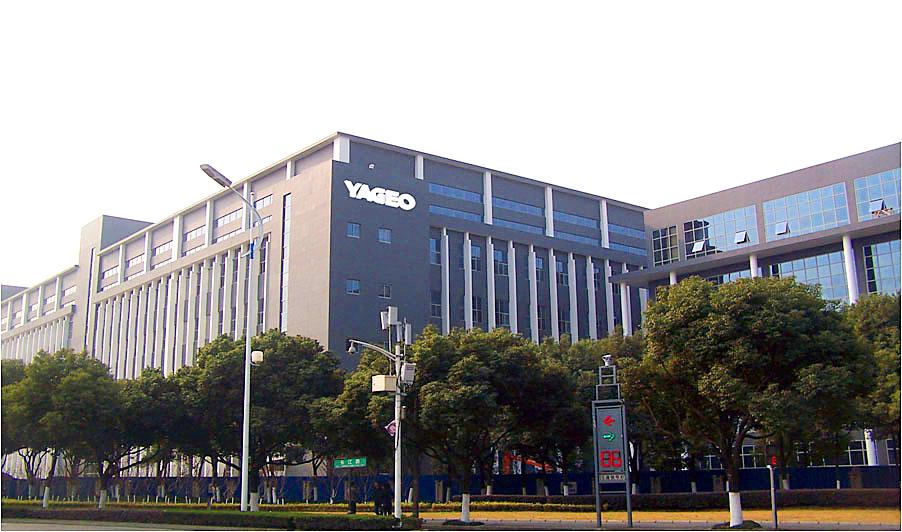Yageo Corp (國巨) on Thursday proposed lowering its paid-in capital by 20 percent as part of its financial restructuring plan.
The world’s third-largest multi-layer ceramic capacitor supplier proposed at a board meeting to reduce its capital by NT$1.08 billion (US$38.08 million) to NT$4.32 billion, joining a growing list of technology companies that have sought to lower capital and boost earnings per share.
The company said it would distribute NT$2 in cash for every share to complete the capital reduction.

Photo: Chang Hui-wen, Taipei Times
Additionally, Yageo proposed a cash dividend of NT$10 per share based on last year’s earnings per share of NT$46.46.
Overall, shareholders would receive NT$12 per share if the dividend payout and capital reduction proposals are approved at the company’s annual general meeting on June 8.
It would be the fifth capital reduction Yageo has undertaken since 2013. As of 2017, Yageo’s paid-in capital had been reduced through four capital reductions from NT$22.1 billion in 2013 to NT$3.5 billion.
The company’s capital increased after 2017 to NT$5.4 billion through acquisitions and mergers, such as the purchase of US-based Pulse Electronics Corp in 2018 for NT$22 billion, before acquiring another US rival, Kemet Corp, for US$1.64 billion in 2020.
The latest capital reduction is expected to boost Yageo’s earnings per share to NT$60 next year, analysts said.
Yageo posted a net profit of NT$22.90 billion for last year, up 90.7 percent from a year earlier, while its consolidated sales hit a new high of NT$106.54 billion, up 57.4 percent from a year earlier.
Gross margin improved by 2.8 percentage points from a year earlier to 40.4 percent.
Yageo said it expects sales for the first quarter of this year to grow between 11 percent and 14 percent from NT$25.69 billion a quarter earlier on the back of an increase in shipments of high-end passive electronics components.
Its business could be affected by the military conflict between Russia and Ukraine, although it does not import any raw materials from either country, the company said.

GROWING OWINGS: While Luxembourg and China swapped the top three spots, the US continued to be the largest exposure for Taiwan for the 41st consecutive quarter The US remained the largest debtor nation to Taiwan’s banking sector for the 41st consecutive quarter at the end of September, after local banks’ exposure to the US market rose more than 2 percent from three months earlier, the central bank said. Exposure to the US increased to US$198.896 billion, up US$4.026 billion, or 2.07 percent, from US$194.87 billion in the previous quarter, data released by the central bank showed on Friday. Of the increase, about US$1.4 billion came from banks’ investments in securitized products and interbank loans in the US, while another US$2.6 billion stemmed from trust assets, including mutual funds,

AI TALENT: No financial details were released about the deal, in which top Groq executives, including its CEO, would join Nvidia to help advance the technology Nvidia Corp has agreed to a licensing deal with artificial intelligence (AI) start-up Groq, furthering its investments in companies connected to the AI boom and gaining the right to add a new type of technology to its products. The world’s largest publicly traded company has paid for the right to use Groq’s technology and is to integrate its chip design into future products. Some of the start-up’s executives are leaving to join Nvidia to help with that effort, the companies said. Groq would continue as an independent company with a new chief executive, it said on Wednesday in a post on its Web

Even as the US is embarked on a bitter rivalry with China over the deployment of artificial intelligence (AI), Chinese technology is quietly making inroads into the US market. Despite considerable geopolitical tensions, Chinese open-source AI models are winning over a growing number of programmers and companies in the US. These are different from the closed generative AI models that have become household names — ChatGPT-maker OpenAI or Google’s Gemini — whose inner workings are fiercely protected. In contrast, “open” models offered by many Chinese rivals, from Alibaba (阿里巴巴) to DeepSeek (深度求索), allow programmers to customize parts of the software to suit their

JOINT EFFORTS: MediaTek would partner with Denso to develop custom chips to support the car-part specialist company’s driver-assist systems in an expanding market MediaTek Inc (聯發科), the world’s largest mobile phone chip designer, yesterday said it is working closely with Japan’s Denso Corp to build a custom automotive system-on-chip (SoC) solution tailored for advanced driver-assistance systems and cockpit systems, adding another customer to its new application-specific IC (ASIC) business. This effort merges Denso’s automotive-grade safety expertise and deep vehicle integration with MediaTek’s technologies cultivated through the development of Media- Tek’s Dimensity AX, leveraging efficient, high-performance SoCs and artificial intelligence (AI) capabilities to offer a scalable, production-ready platform for next-generation driver assistance, the company said in a statement yesterday. “Through this collaboration, we are bringing two